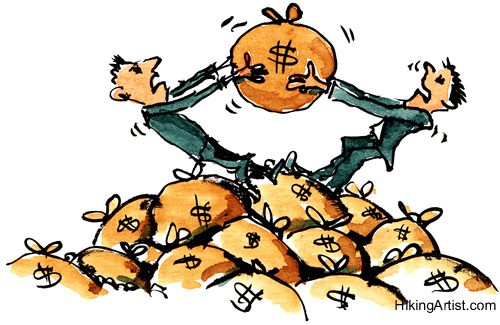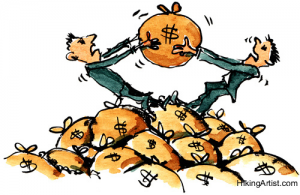
Behind eBook pricing: Apple, the Big 6 and Amazon
 Behind eBook pricing: Apple, the Big 6 and Amazon
Behind eBook pricing: Apple, the Big 6 and Amazon
On March 9th, the Wall Street Journal relayed the warning received by Apple and 5 of the Big 6 (CBS Corp.’s Simon & Schuster Inc.; Lagardere SCA’s Hachette Book Group; Pearson PLC’s Penguin Group (USA); Macmillan, a unit of Verlagsgruppe Georg von Holtzbrinck GmbH; and HarperCollins Publishers Inc., a unit of News Corp., ) about their policies regarding ebook pricing.
This is a new chapter in an ongoing antitrust battle against the major traditional publishers.
In early 2010, as it prepared to introduce its first iPad, Apple changed the way that publishers charged for e-book. Until then, the accepted agreement between publishers and retailers was that the publisher sold its books to the retailer for around 50% of the recommended cover price, yet enables booksellers to offer those books to customers for less than the cover price if they elected to do so.
As Apple prepared to introduce its first iPad, they introduced the “agency model,” under which the publishers would set the price of the book and Apple would take a 30% cut. Apple also stipulated that publishers couldn’t let rival retailers sell the same book at a lower price.
Walter Isaacson, Steve Jobs biographer quoted Mr. Jobs stating that “We told the publishers, ‘We’ll go to the agency model, where you set the price, and we get our 30%, and yes, the customer pays a little more, but that’s what you want anyway.'”
In parallel, Amazon Inc. was working hard to build its lead in e-books by selling many new best sellers at $9.99, a move designed to encourage consumers to buy its Kindle electronic readers. Publishers thoroughly disapproved of that strategy. They fearing that consumers would get used to buy inexpensive e-books and that it would limit the publishers’ ability to sell digital books at higher prices.
Amazon’s move worried publishers who feared they would not be able to compete with Amazon’s discounts.
They publishers imposed the agency model across the industry, According to Mr. Isaacson, Steve Jobs said that “They went to Amazon and said, ‘You’re going to sign an agency contract or we’re not going to give you the books.’ “
This lead the Justice Department to suspect that Apple and the publishers acted in concert to raise prices across the industry. According to people familiar with the subject, the Justice Department is preparing to sue them for violation of federal antitrust laws.
The publishers deny acting jointly to raise prices, claiming that that the shift to agency pricing, far from infringing antitrust laws, is enhancing competition in the publishing industry by allowing more electronic booksellers to prosper.
Increasing the odds for more electronic booksellers to prosper is exactly the opposite of what Amazon is doing, often sold best-selling digital books for less than it paid for them in order to attract more buyers to its Kindle devices.
Yet this is not the issue worrying the Justice Department. More predominant is the clause in Apple’s “agency model” that contains a clause stipulating that publishers couldn’t let rival retailers sell the same book at a lower price.
In order to avoid a costly trial, the parties concerned are currently working out a settlement with the Justice department that might include a watering down of the incriminating clause, preserving the gist of the agency model but allowing some discounts by booksellers.
Future will tell which way the dispute will be solved and how it will affect the prices paid for ebooks by consumers.